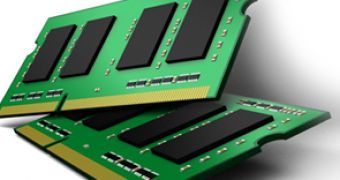There's a general trend in the IT industry for the development of more energy-efficient solutions that can enable increased battery life and higher-performance consumer devices and which can now be found in a series of hardware components, ranging from processors to memory and storage devices. On that note, Micron Technology has just announced the availability of new high-bandwidth DDR3 memory modules, designed for notebook computer systems and users looking for a higher-performance, more efficient solution for their laptops. According to Micron, the new modules are already available in densities of up to 2GB, but the company plans to expand the offering with double the capacity in the near future.
“Across the board, we are making our DRAM more efficient – from both a power and performance perspective – which ultimately empowers users to be more productive,” said Robert Feurle, vice president of DRAM marketing at Micron. “Our new DDR3 notebook modules offer approximately a 20 percent reduction in power usage compared to standard 1.5-volt modules while maintaining DDR3’s high performance advantage, enabling a desktop-class computing experience for portable computers.”
According to the memory maker, the new modules are built with energy-efficiency in mind, which is why these new modules are rated at the industry's lowest 1.35-volt operating voltage, compared to other 1.5-volt DDR3 memory. In addition, Micron also highlights the modules' optimized bandwidth of 1,333 megabits per second. Micron has also been collaborating with graphics chip maker NVIDIA, which will likely adopt the company's memory solutions for its upcoming notebook processing units, ultimately providing users with increased performance and energy efficiency.
“Our notebook graphics processing units deliver industry-leading performance and visual fidelity,” said Barry Wagner, director of technical marketing at NVIDIA. “Micron has been a valued partner in defining the performance and power parameters necessary for portable computing applications. We look forward to working with Micron to validate their new modules with our notebook processing solutions.”

 14 DAY TRIAL //
14 DAY TRIAL //